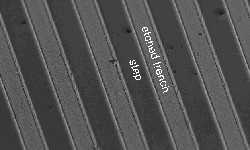Projekte
Halbleitende Nanostrukturen als Grundbausteine für eine zukünftige Elektronik-Kontrolliertes Wachstum und biologische Tools für ihre Anordnung und Integration

Projektbeschreibung
The lithography based (top down) miniaturization of microelectronics is expected to reach a dead-end in about ten years. Silicon nanowires are considered viable alternatives, provided that suitable bottom up integration approaches are developed. This project aims to develop tools for growth, bio-inspired assembly and bio-inspired integration of semi-conducting nanostructures as building blocks for future electronics and optoelectronics.
Controlled growth of well defined, uniform nanostructures is the first, mandatory requirement to be tackled.
Using the remarkable assembly capabilities of bio-molecules we will then develop tools to recognize, attach, deliver and incorporate these well-defined structures in specific sites on a microelectronic layout. Finally, ways to fabricate functional electronics out of these nanostructures will be explored with the circuit assembly done either prior or after the integration of the nanostructures.
The research program combines experimental studies with a theoretical backup for each component of the proposal.
We are aware of the ambitious, high-risk nature of this proposal but even partial fulfillment of its targets will reflect significant scientific and technological steps forward including:
(1) Elucidation of the growth mechanisms of semi-conducting nanostructures,
(2) Establishment of a correlation between size/structure/morphology and their electrical and optical properties (the essence of nanoscience),
(3) Elucidation of mechanisms leading to recognition and selective attachment of bio-molecules to inorganic nano surfaces,
(4) Practical processes for controlled growth of well-defined nanostructures and device fabrication,
(5) Processes for the integration of nanostructures / nanodevices with conventional electronics.
Laufzeit
08.03.2010 bis 30.06.2012
Projektleitung
Zacharias M
Telefon:203-7421
E-Mail:zacharias@imtek.de
Kooperationspartner
Prof. Yeshayahu Lifshitz, Technion – Israel Institute of Technology, Haifa 32000, Israel
Prof. Uri Sivan, Technion – Israel
Prof. Thomas Frauenheim, Institute of Technology Bremen University, Germany
Prof. Yoram Reiter, Technion – Israel Institute of Technology
Finanzierung
DFG (DIP)
Schlagworte
Nano, Nanotechnology, Materials, Nanomaterials, Nanostructures, Nanolithography, Atomic Layer Deposition, Zinc Oxide

